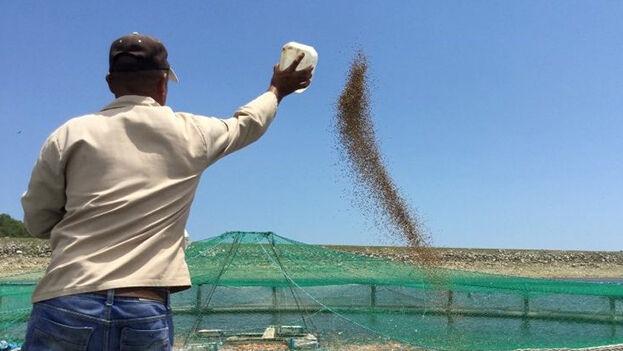
![]() 14ymedio, Havana, 24 November 2022 — The aquaculture workers of Sancti Spíritus have been able to fulfill only 57% of their production plan for 2022. A lower presence of species, the shortage of fuel to carry out the extraction work and the lack of maintenance of the dams are some of the difficulties they face.
14ymedio, Havana, 24 November 2022 — The aquaculture workers of Sancti Spíritus have been able to fulfill only 57% of their production plan for 2022. A lower presence of species, the shortage of fuel to carry out the extraction work and the lack of maintenance of the dams are some of the difficulties they face.
Miriam Solano Valle, a specialist in Aquaculture at the Sancti Spíritus Fishing Company, told the provincial newspaper Escambray that the production deficit to date is 1,694 tons. The decline will affect the production of foods that use fish as raw material and that are distributed in the network of specialized ’boxes’.
Solano Valle indicated that the different fishponds, mainly the Zaza dam, have not received maintenance or cleaning in the areas covered with invasive plants since 2017, due to fuel shortages. The same cause hinders the entire food and beverage industry on the Island and has slowed down production from bread-making to meat plants.
As a result, the company spokeswoman explained, 40% of the surface of Cuba’s largest pond is covered with weeds and the invasive marabu, which hinder the fishermen’s maneuvers, since fish find refuge in the weeds.
To the rosary of problems that afflict the sector are added the damage to the ice plant and the freezing tunnel and delays attributed to the excessive rain from Hurricane Ian, at the end of last September.
Nor has this 2022 been able to increase the offspring at the Alevines Station of the Sancti Spíritus municipality of La Sierpe. Of the 31.4 million offspring that are destined each year for this fish pond, about 30 million were sent to Zaza, where 87% of the catches in the province are obtained.
Solano Valle pointed out that the decline in fishing is also due to unprotected exploitation in the intensive cultivation of clarias and tilapia, which are then used as raw materials in the production of feed for farm animals.
The crisis of the fishing sector in Cuba doesn’t seem to ease, nor is there a glimpse of the possibility of recovery. A year ago, in December 2021, the Government recognized that this sensitive sector for Cuban families will not recover the levels of production it experienced more than three decades ago.
Aquaculture has been a lifeline in Cuba, because the country cannot fish in international waters since it doesn’t meet the requirements and has not renewed its old fleets. In addition, the Island has no truly fast-flowing rivers that allow adequate freshwater fishing.
Translated by Regina Anavy
____________
COLLABORATE WITH OUR WORK: The 14ymedio team is committed to practicing serious journalism that reflects Cuba’s reality in all its depth. Thank you for joining us on this long journey. We invite you to continue supporting us by becoming a member of 14ymedio now. Together we can continue transforming journalism in Cuba.
